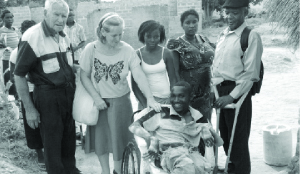
•VOLUNTEERS Arjal and Baker involved in supporting community schools in Northern and Luapula provinces under project OSCAR donate a wheelchair to Victor Mwansa surrounded by family members.
By DR FELIX SILWIMBA –
IN today’s article, I start by saying a little about my mentor, my late Dad Jatson Silwimba (Mzee), who served as an educationist in Chinsali District from 1963 to 1981.
From 1963 to 1967 he taught at Lubwa mission School, then from 1968 to 1981 at Chinsali Government School.
His prolonged stay in Chinsali was partly because of my physical condition as the educational authorities were so caring that they did not want to overburden him with the responsibility of looking after me, in terms of healthcare.
He was a graduate of Kitwe Teachers Training College, he did two years of secondary education at Chiwala Secondary School for African Children.
My father stood 1.8 metres tall and his footwear was size 12. Until about 1974, he preferred to buy clothes through the post office, from “Oxendales” a UK and Ireland based retail shop.
He was a dedicated teacher and quiet studious, to this day his former pupils and workmates still revere him.
The two household chores he tasked me to tender daily were poultry to ensure that the hawks roaming the skies do not snatch away the chicks, every evening, I had to account for the chickens, chicks and suggest ways of reducing the loss.
The second task was to dust his bookshelf regulary and arrange books in a particular order. The order was by subject matter, there was a section for the Rapid Results Correspondence College (RRCC) study materials in General Certificate of Education subjects were English, Economics, religious Education, Economics, Geography, History, Sociology and English Law.
The other section had African writer series novels others had general readership books the titles I can remember are “Hidden Persuaders”, Getting the most out of life a Readers Digest,” “the Watergate Scandal”, “Scouting” by Baden Powel and “ComputerMan” a Science Fiction.
He had no serious political inclinations, even during the excitement of UPP in Chinsali, Dad simply kept away and never allowed political debates in the family. He always reminded us to think and talk about things that would bring food at the table in our home.
At this moment, let me share my views on communication, firstly communication involves several process that could be body language through facial expression, nodding, gestures etc, speech, its content, expression, low pitched, medium or high pitched.
To communicate, there has to be a sender of the message, a mode of transmission and the receiver.
Human messages are usually coded and the receiver must be able to decode the message for him or her to get the exact meaning.
For example, every spoken language is coded and only those who are able to decode getting the meaning of what is being communicated.
In spoken languages, especially the mother tongue on cannot even pin point the time when he was certified competent because we learn it overtime and naturally develop the required competencies and skills.
Poor communication amongst people or animals of a kind can lead to serious confusion and the worst to death of the entire grouping.
Like what happens in a stampede. The other side of communication is the role of an individual in a particular social grouping like a herd of impalas grassing under cover of some tall grass.
There is one who sporadically lifts up the head and moves ears from different angles and sniffles the air for intruders should danger be sensed alarm is raised at the herd runs for safety.
Such an act places this individual at risk of being spotted and killed. This individual behaviour is described as altruism and has been used since time immemorial to save social animals including humans from danger.
It is apparent that in Zambia that persons with disabilities particularly those in the vulnerable categories, have learnt to communicate their needs through inappropriate methods those that are particularly bordered on disrupting the peace of others.
The law enforcement procedures are not clear on how best to handle such without being in conflict with international provisions for the rights of persons with disabilities.
The law enforcement officers lack infrastructure suitable for holding persons with disabilities.
The question then is should we invest resources in constructing such or invest in educating persons with disabilities on issues of law and disability.
I look forward to the Zambia Agency taking a lead in the education of the public and the persons with disabilities themselves and their representative organizations. For a democracy to succeed dialogue should be encouraged.
(The author is Director General Zambia Agency for Persons with Disabilities. Post Polio Person, Independent Living activist)






